
The Transformative Power of Journaling in Disability Support
Journaling is a versatile and accessible activity that offers profound benefits for adults with disabilities. Whether used for emotional regulation, personal growth, or advocacy, writing provides a safe space to process experiences, foster self-awareness, and express oneself freely. This article explores the multifaceted role of journaling, highlighting its importance in promoting mental health, supporting therapeutic and educational goals, and creating inclusive environments that empower individuals to participate actively in their personal and community lives.
Promoting Accessibility in Journaling Practices
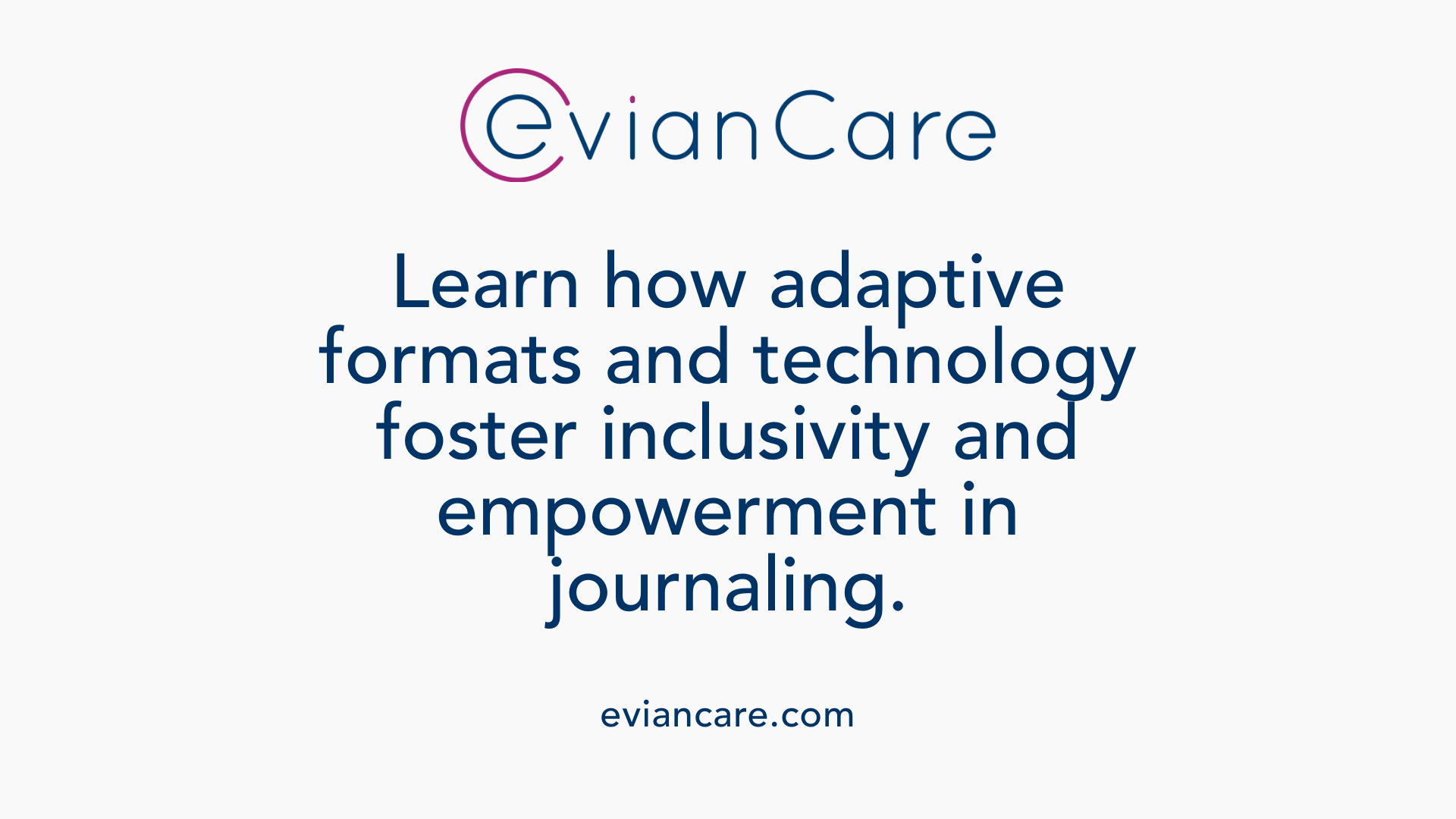
Why is it important to promote accessible journaling practices for adults with disabilities?
Creating accessible journaling options is essential because it ensures that adults with disabilities can fully participate in the activities of self-expression, reflection, and therapy. When journaling is made accessible, individuals with visual, cognitive, or physical impairments can engage comfortably, which supports mental health and emotional resilience.
Accessible formats include using plain language, large print, audio recordings, or digital tools that accommodate different needs. For example, some people might find traditional pen-and-paper journaling difficult due to motor coordination challenges, so voice-to-text applications or speech-recognition software can be used as alternatives.
Respectful and inclusive design also involves language that promotes dignity. Avoiding condescending or stereotypical terms fosters a respectful environment. Incorporating person-centered language emphasizes abilities over limitations, which can boost confidence and promote positive self-identity.
Technology plays a vital role in supporting accessibility. Platforms like Penzu and Journey offer online journaling options with customizable features such as adjustable font sizes, screen readers, or multimedia inputs. These tools remove physical barriers and allow individuals to choose their preferred method of recording thoughts and feelings.
In summary, promoting accessible journaling practices helps remove obstacles, fosters inclusivity, and empowers adults with disabilities to use journaling as a meaningful form of self-care. Such practices support their emotional well-being and ensure they can express their stories on their terms, reinforcing the importance of equity and respect in personal reflection activities.
Mental Health Benefits of Journaling for Adults with Disabilities
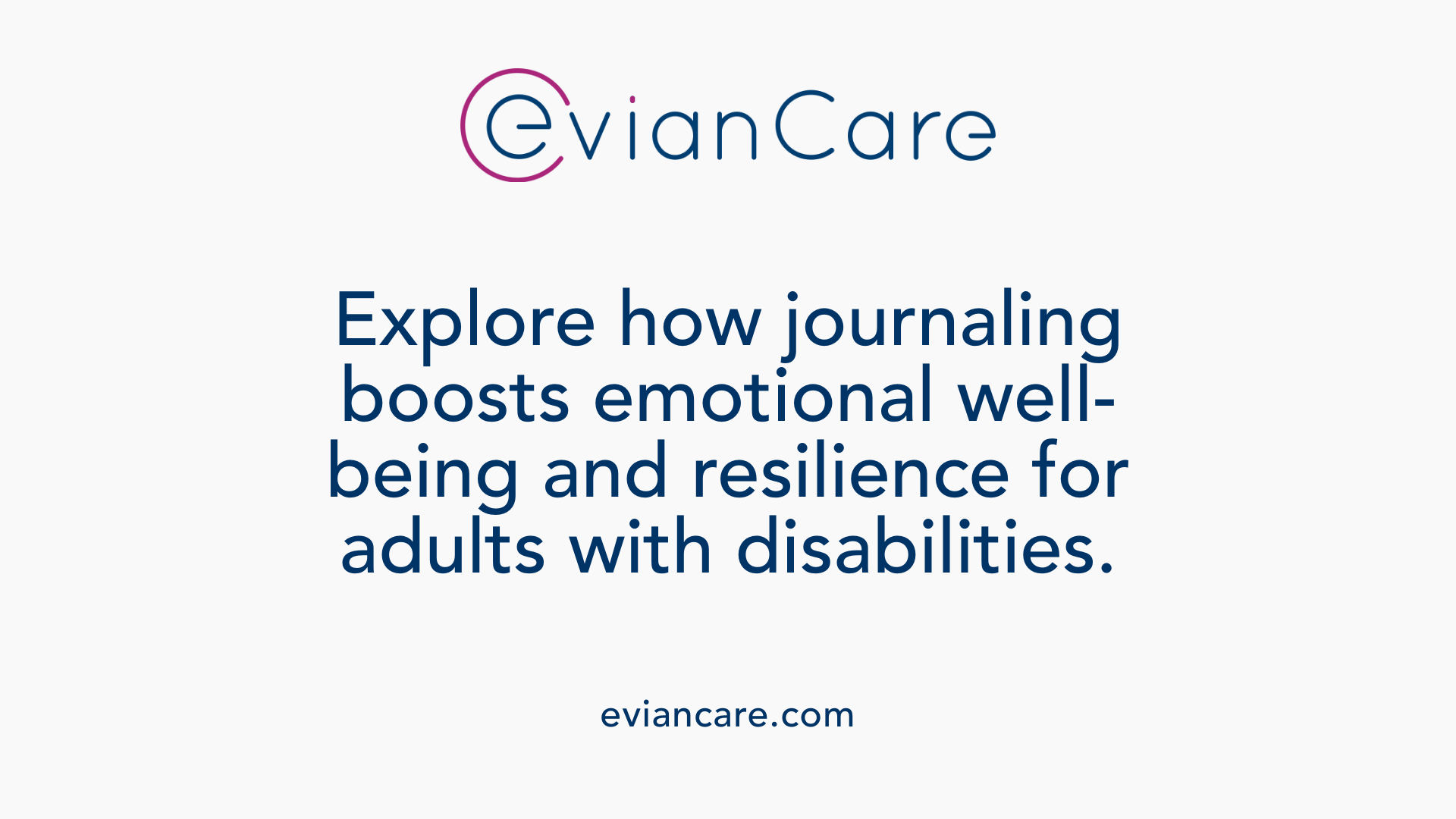
What are the benefits of journaling for the mental health and emotional well-being of adults with disabilities?
Journaling is a valuable self-care practice that offers substantial benefits for adults with disabilities. It serves as an effective way to express emotions, process experiences, and develop self-awareness. Regular writing helps reduce feelings of stress, anxiety, and depression, which can be common among individuals facing physical or mental health challenges.
By providing a private and accessible space, journaling encourages reflection, emotional regulation, and cognitive reframing. This supports resilience, helping individuals cope with ongoing hardships and foster a positive outlook. Practices like expressive writing and gratitude journaling have been shown to lift mood, decrease worries, and promote optimism.
In addition to emotional relief, journaling can aid in goal setting and personal growth. It also offers physical health benefits, such as boosting immune function and reducing symptoms of conditions like asthma and rheumatoid arthritis. Accessible formats, including digital platforms like Journey or Penzu, and alternative techniques like making lists or using multimedia, make journaling feasible for many adults with disabilities.
Overall, this versatile activity helps improve mental health by strengthening emotional well-being, supporting resilience, and enhancing overall quality of life for adults facing diverse challenges.
Fostering Self-Expression and Personal Growth
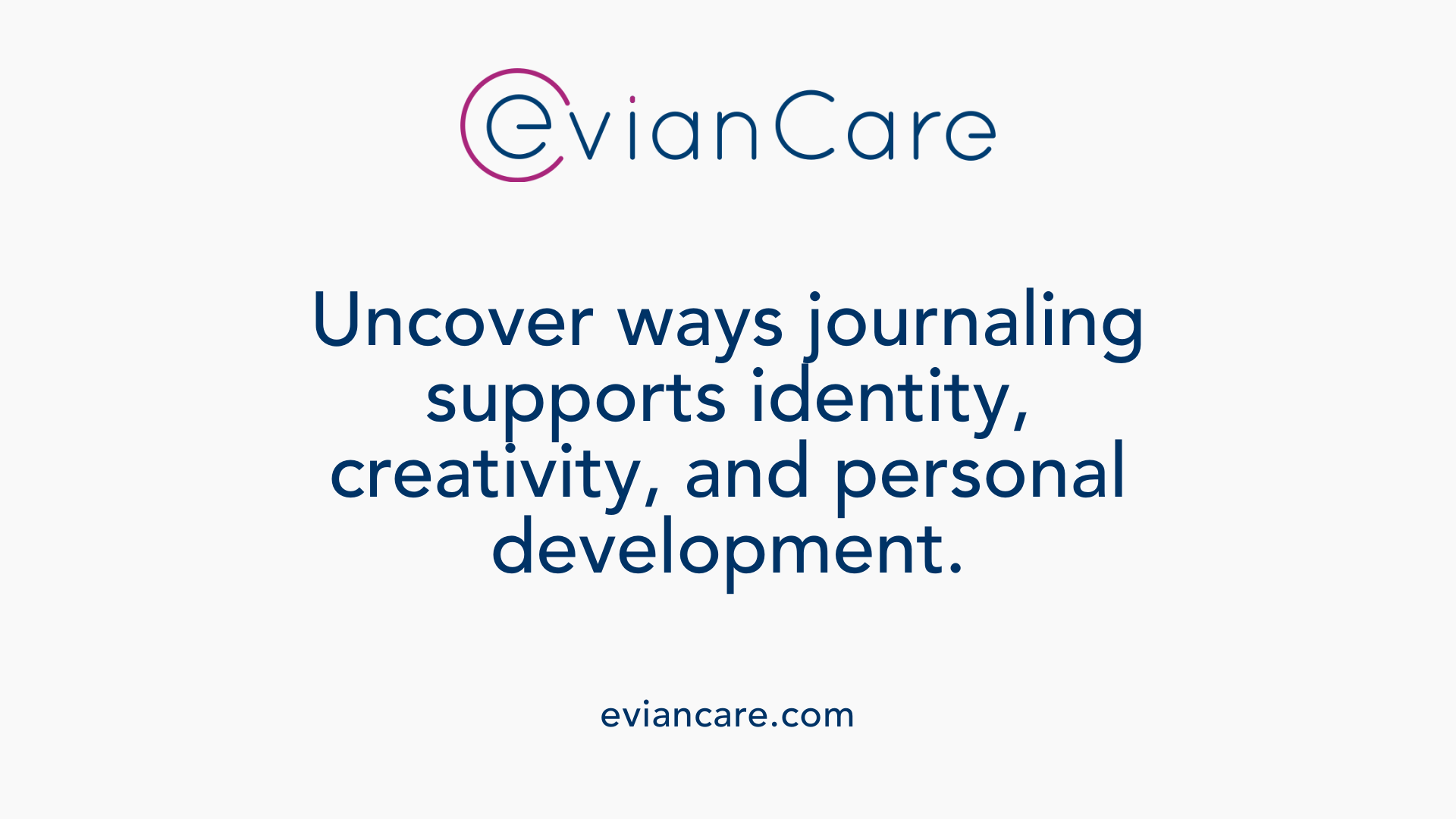
How can journaling support self-expression and personal growth for adults with disabilities?
Journaling offers a vital outlet for adults with disabilities to express their thoughts, feelings, and experiences in a safe and private space. This practice fosters self-awareness and emotional regulation by helping individuals better understand their inner worlds. Creative prompts, such as imagining exciting journeys or inventing personal stories, serve as catalysts for exploring identity, strengths, and future goals. These activities encourage reflection and help individuals recognize their capabilities beyond limitations.
Structured methods, like making lists or mind-mapping, provide a clear framework for those who prefer organized approaches, making journaling more accessible. For example, adults with ADHD or autism may find visual tools or step-by-step prompts helpful in managing their thoughts and emotions. Tailoring the journaling process to personal needs—whether through drawing, voice recordings, or digital platforms—enhances engagement and consistency.
In addition, journaling supports personal development by tracking progress over time. It enables individuals to monitor emotional states, celebrate achievements, and identify patterns that inform coping strategies. Programs such as the Baddour Center’s Skills for Achieving Independent Living (SAIL) incorporate creative writing activities to boost communication skills and foster self-growth.
Ultimately, integrating journaling into daily routines empowers adults with disabilities to articulate their stories, reflect on their journey, and pursue personal aspirations, contributing meaningfully to their overall well-being.
| Method | Description | Best For |
|---|---|---|
| Free writing | Unstructured, open-ended journaling | Expressing feelings, exploration |
| Creative prompts | Guided activities like storytelling or imagining | Inspiration, self-discovery |
| Visual journaling | Using images, drawings, or symbols | Visual thinkers, sensory sensitivities |
| Digital tools | Apps like Penzu or Journey | Accessibility, convenience |
| Voice-to-text | Recording spoken thoughts | Limited mobility, writing difficulties |
Strategies and Accommodations for Accessible Journaling
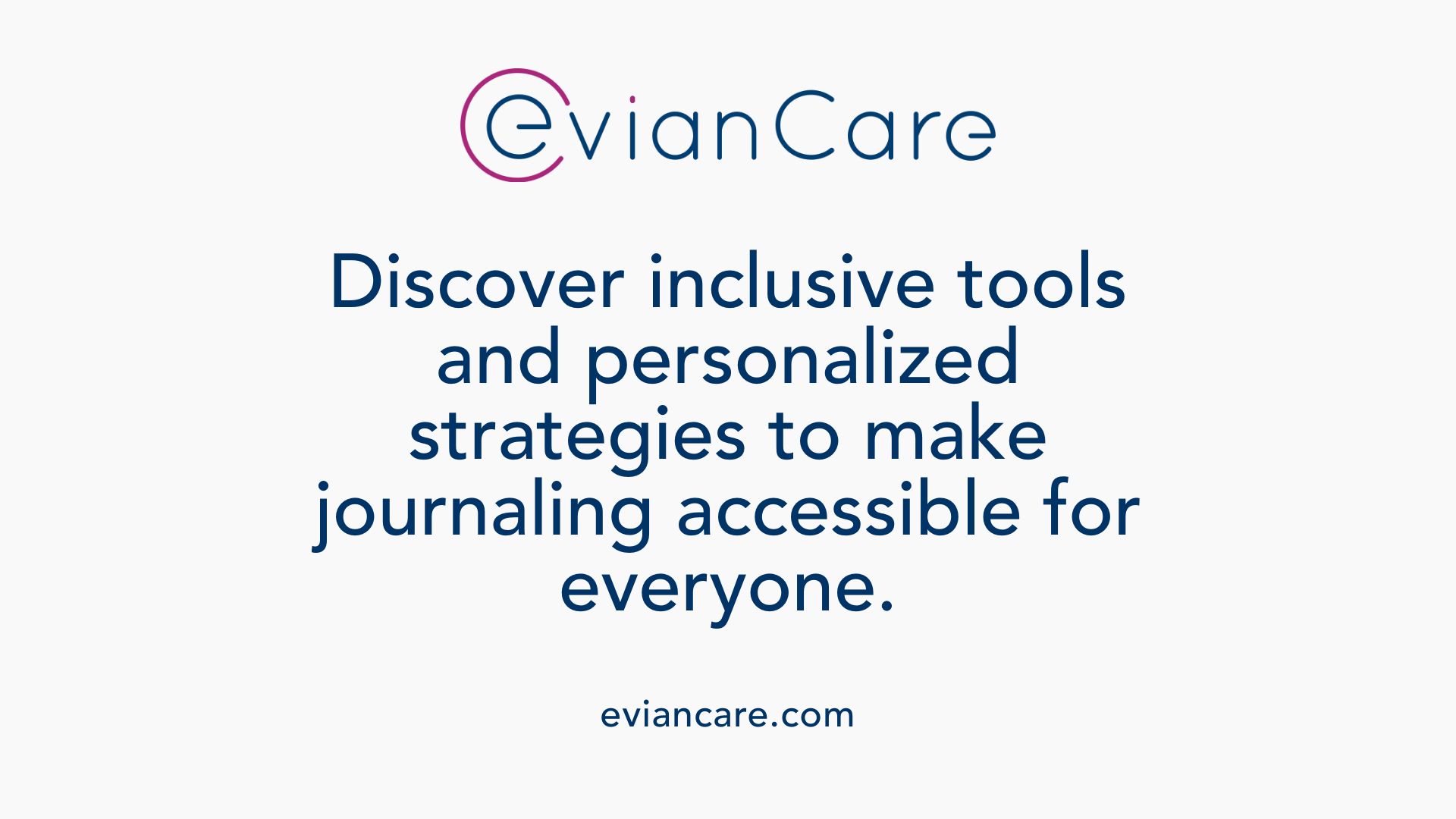
What strategies and accommodations can make journaling accessible for adults with various disabilities?
Making journaling inclusive and accessible requires a thoughtful combination of tools, environment adjustments, and creative approaches. These strategies help ensure that all individuals, regardless of their physical, cognitive, or sensory challenges, can enjoy the benefits of self-expression and emotional reflection.
Assistive technologies play a crucial role. Speech-to-text software allows those with limited hand mobility or fine motor skills to record their thoughts easily. Adaptive writing tools, such as grips or slant boards, can support individuals with tremors or arthritis. Audio and video journaling options provide alternative mediums for expression, accommodating those with dysgraphia or sensory sensitivities.
Environmental modifications also enhance accessibility. Creating a sensory-friendly space with calming colors, soft lighting, and minimal clutter helps neurodivergent individuals feel comfortable and focused. Providing a designated, comfortable area for journaling encourages a regular habit and reduces sensory overload.
Creative media and formats can make journaling more engaging. Using visual aids like high-contrast charts or picture prompts helps individuals with cognitive impairments. Integrating digital features, such as mind-mapping tools or customizable templates, allows for organized and flexible journaling routines.
Tailored prompts and explicit instructions support individuals with neurodiversity or cognitive disabilities, guiding their writing process without feeling overwhelmed. Simplified layouts or visual cues can assist those with executive functioning challenges in managing their thoughts.
Inclusion also requires respectful language. Using person-first terminology and encouraging individuals to share their preferred descriptors fosters dignity and empowerment.
Overall, these accommodations work together to create an equitable environment where everyone can benefit from journaling. Whether through technology, environment, or format, the goal is to support personal growth, emotional well-being, and self-awareness for all individuals.
Therapeutic and Educational Uses of Journaling
Journaling offers significant benefits in therapeutic and educational contexts for adults with disabilities. It serves as a meaningful tool for processing trauma and emotions by providing a safe space to explore feelings, reflect on experiences, and release emotional tension.
Structured expressive writing protocols, such as the method developed by Dr. James Pennebaker, encourage individuals to write about stressful or traumatic events over multiple consecutive days. Research shows that such activities can improve both mental and physical health, including reductions in stress, depressive symptoms, and posttraumatic stress. For example, adults with various medical conditions or disabilities have experienced enhanced immune functioning and emotional resilience through these practices.
Because traditional journaling might be challenging for some, tailored approaches can help. Using visual aids, making lists, mind-mapping, or employing creative media like drawings or multimedia input tools can make journaling more accessible. Supportive environments, such as sensory-friendly spaces with calming colors, can further improve engagement, especially for neurodivergent individuals.
In educational and clinical settings, journaling promotes self-awareness and strengthens coping skills. It enables individuals to understand their thoughts better, identify triggers, track symptoms, and articulate goals. Such reflective activities contribute to personal growth and often lead to improved emotional well-being.
Overall, when using tailored strategies and integrating various formats, journaling becomes a powerful means to support emotional health, foster resilience, and enhance learning or recovery for adults with disabilities.
Managing Stress and Cognitive Challenges through Journaling
How can journaling help adults with disabilities manage stress and cognitive challenges?
Journaling offers a practical way for adults with disabilities to handle stress and overcome cognitive hurdles. It provides a safe space to express feelings and reflect on experiences, which is essential for emotional regulation. Regular writing helps clarify confusing thoughts, making them easier to process.
By recognizing recurring patterns in negative thinking, individuals can challenge and change unhelpful thought habits. Whether using expressive writing, gratitude lists, or visual journaling, participants can improve mental clarity and boost self-awareness.
On a physiological level, journaling can activate calming responses, like the parasympathetic nervous system, which promotes relaxation. This 'rest-and-digest' state can lower stress hormones, reduce anxiety, and foster a sense of calm.
Accessible and flexible, journaling can be done anywhere—using pen and paper or digital tools such as Penzu or Journey—to suit different needs and preferences. Overall, it supports emotional health, cognitive organization, and resilience for adults managing disabilities.
Supporting Self-Advocacy and Personal Documentation
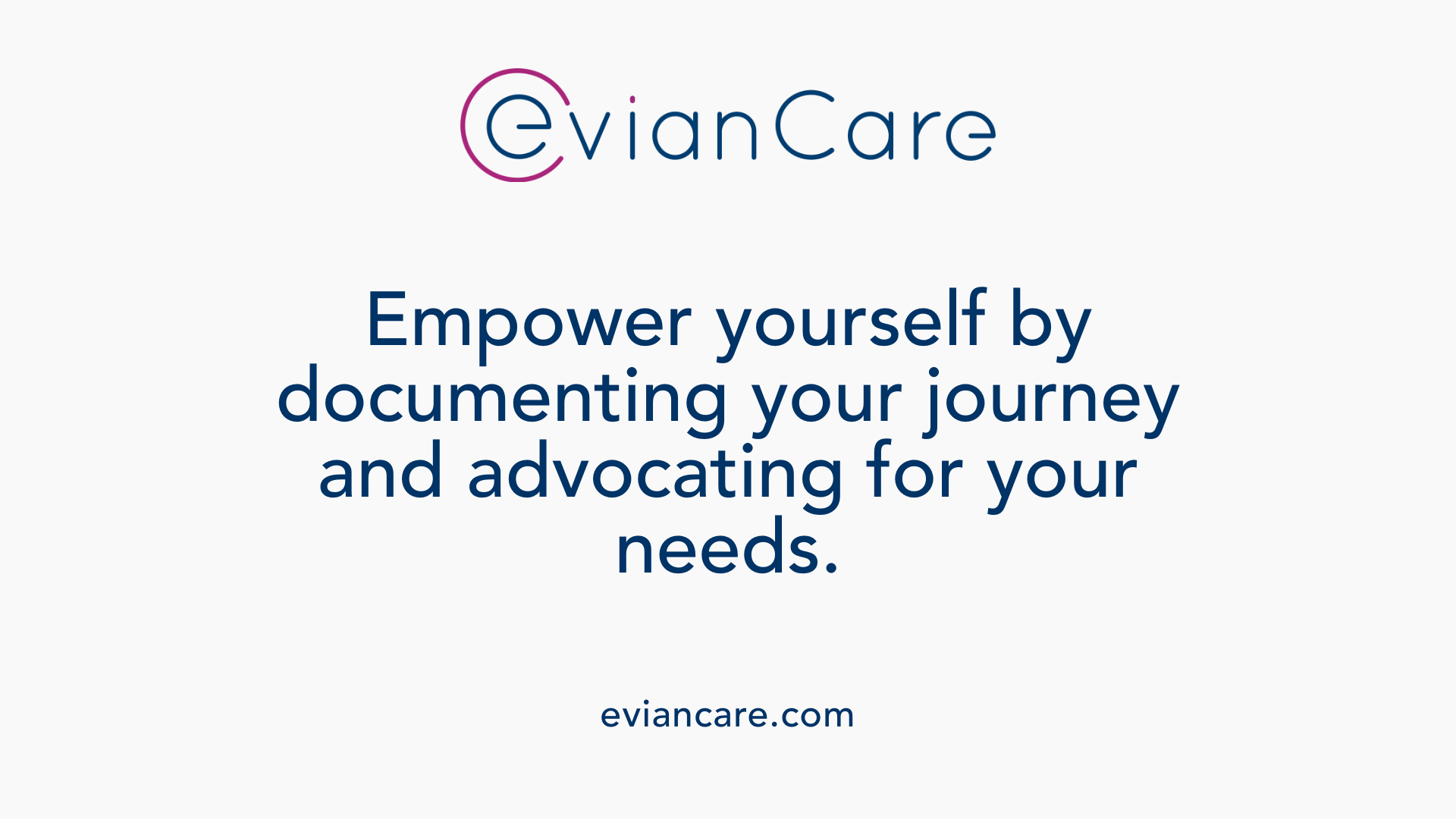
How can journaling support adults with disabilities in documenting their experiences and advocating for themselves?
Journaling offers a meaningful way for adults with disabilities to record their daily lives, challenges, and achievements. This ongoing record helps affirm their identities and stories, serving as a personal archive that captures their experiences authentically.
Beyond mental health benefits, detailed journals can be powerful tools for advocacy. They provide concrete evidence of how disabilities affect daily activities, which can be vital in legal situations or when applying for benefits. For example, entries describing symptom severity, specific tasks that are difficult, and triggers can support claims for disability accommodations.
Journaling also serves as a form of reclaiming agency. When individuals document their experiences and challenges, they actively shape their narrative, resisting societal stereotypes and stigma. Sharing these stories—whether privately or publicly—can raise awareness and foster understanding.
Creative journaling approaches, like junk journaling that includes photographs, memorabilia, or artifacts, deepen personal connection and foster expression. Such practices not only promote self-reflection but can also highlight personal resilience and advocate for greater societal inclusion.
In summary, journaling empowers adults with disabilities to advocate for their needs, participate actively in their communities, and make their stories visible. It’s a simple yet profound tool that supports both self-advocacy and societal change.
Empowering Through the Pen
Journaling stands as a vital tool for supporting adults with disabilities across emotional, therapeutic, educational, and advocacy domains. By promoting accessible, tailored practices and resources, we can foster an inclusive environment where every individual can harness the power of writing. Whether used for self-expression, managing stress, documenting personal journeys, or advocating for rights, journaling inspires resilience, promotes well-being, and affirms the dignity of each person. As a simple yet profound act, journaling invites adults with disabilities to tell their stories, explore their potential, and participate actively in their own growth and society at large.
References
- How To Start a Journaling Practice
- Journaling Tips for Adults with Learning Disabilities or ...
- 12 Creative Writing Prompts to Empower and Inspire Adults ...
- Online Positive Affect Journaling in the Improvement ...
- Therapeutic Journaling - Whole Health Library
- Using a Journal to Support Your Social Security Disability Claim
- Spinal Cord Injury Coping Skills: Journaling
- Steps journals can take to support authors living with disabilities
- Benefits of Journal Writing for Adults with ADHD
- Learn How a Disability Journal Can Help Your ...












